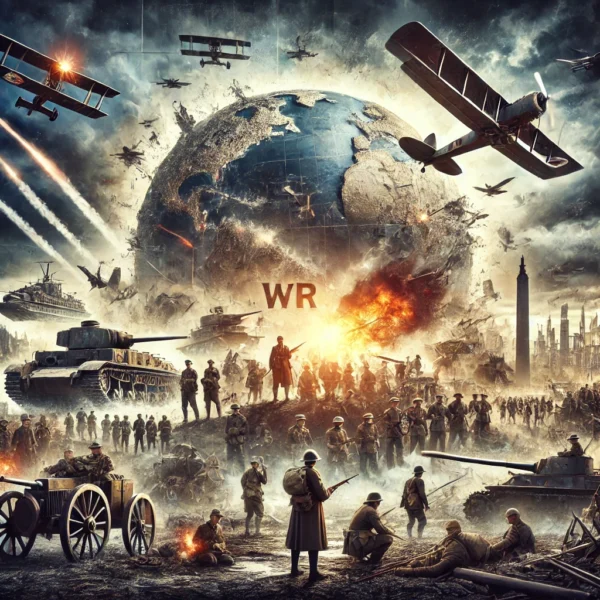Throughout history, wars have shaped nations, changed borders, and influenced cultures. The most important of these are the two World Wars, which had a huge impact on the global stage. In this blog, we’ll explore the biggest wars the world has ever fought, focusing on world wars and other major global conflicts.
1. World War I (1914-1918)
World War I, commonly known as the “Great War“, involved many of the world’s major powers, particularly in Europe. The assassination of Archduke Franz Ferdinand of Austria triggered the conflict, which escalated into a full-scale war pitting the Allies (which included France, Britain, Russia, and later the United States) against the Central Powers (Germany, Austria-Hungary, and the Ottoman Empire).
- The impact was profound, with over 16 million lives lost, resulting in major geopolitical shifts, such as the fall of empires like the Ottoman, Austro-Hungarian, and Russian. The Treaty of Versailles, which concluded the war, imposed severe reparations on Germany, laying the groundwork for World War II.
2. World War II (1939-1945)
World War II is known as the deadliest and most far-reaching conflict in human history. It began when Germany, led by Adolf Hitler, invaded Poland, causing Britain and France to declare war. The Axis powers, consisting of Germany, Italy and Japan, fought a fierce war against the Allies, including Britain, the Soviet Union, the United States and others, which spanned almost every continent.
- Impact: Over 70 million people perished, including the victims of the Holocaust. The war ended with the defeat of Nazi Germany and Imperial Japan, leading to the Cold War between the U.S. and the Soviet Union. The United Nations was established to promote peace and prevent future World Wars.
3. The Napoleonic Wars (1803-1815)
Before the world wars, the Napoleonic Wars were one of the most important conflicts in history. Under the leadership of Napoleon Bonaparte, France fought many battles against various European coalitions. Napoleon’s goal was to expand French influence throughout Europe, but after many years of success, he eventually suffered defeat.
- Impact: The wars reshaped Europe, leading to the rise of Britain as a dominant power and setting the stage for nationalist movements across the continent. Though not a World War, the scale of this conflict was massive and involved numerous nations.
4. The American Civil War (1861-1865)
Although not classified as a world war, the American Civil War was a major conflict between the Northern states (the Union) and the Southern states (the Confederacy), primarily centered on issues of slavery and states’ rights. It is the deadliest conflict in American history.
- Impact: Over 600,000 Americans died, and the war led to the abolition of slavery in the U.S. It also cemented federal authority over the states, laying the groundwork for modern American governance.

5. The Korean War (1950-1953)
The world wars had a profound impact on the world, but the Cold War era also saw many proxy wars, including the Korean War. This conflict began when North Korea, with the support of the Soviet Union and China, invaded South Korea. In response, the United States and other members of the United Nations stepped in to aid South Korea.
- Impact: The Korean Peninsula remains divided at the 38th parallel, with North Korea developing into a highly secretive, authoritarian state. The war also set the tone for U.S.-Soviet rivalry during the Cold War, a direct result of the tensions following the World Wars.
6. The Vietnam War (1955-1975)
The Vietnam War, one of the longest conflicts of the 20th century, was fought between communist North Vietnam, supported by the Soviet Union and China, and South Vietnam, supported by the United States. The war played a significant role in the Cold War era, a period characterized by tensions that arose in the aftermath of World War II.
- Impact: Over 3 million people, including civilians, died in the conflict. The war ended with the unification of Vietnam under communist rule. The war deeply affected U.S. politics and society, with its roots tracing back to the global balance of power established after World War II.
7. The Iraq War (2003-2011)
After World War II, the Iraq War emerged as one of the most significant conflicts of the 21st century. It began with a US-led invasion aimed at overthrowing the government of Saddam Hussein, who was alleged to have weapons of mass destruction (WMD).
- Impact: The war claimed over 100,000 lives and caused major political shifts in the Middle East. It also strained U.S. international relations and contributed to the rise of extremist groups like ISIS.
8. The Syrian Civil War (2011-Present)
The Syrian civil war is a contemporary conflict, but it can be understood against the backdrop of global instability that emerged in the aftermath of the two world wars. What began as pro-democracy protests during the Arab Spring in 2011 quickly escalated into a full-blown war involving various factions, including the government, rebels, and foreign intervention.
- Impact: Over 500,000 people have died, and millions have been displaced, creating a massive refugee crisis. The war has destabilized the region and remains unresolved, a grim reminder of the complexities that often arise from global power struggles.
9. The Russo-Ukrainian War (2014-Present)
The conflict between Russia and Ukraine began in 2014 when Russia annexed Crimea. In 2022 it escalated into a full-scale invasion, one of the largest military confrontations in Europe since World War II.
- Impact: Thousands of lives have been lost, millions displaced, and the geopolitical landscape of Europe has been significantly affected. The war has strained global economies and reignited Cold War-era tensions, a direct consequence of the power dynamics that emerged after the World Wars.
Conclusion: The Lasting Impact of World Wars
Wars, especially world wars, have significantly shaped the modern world. They have changed borders, overthrown governments, and led to the creation of international organizations designed to prevent future conflicts. The effects of the world wars still reverberate in global politics and conflicts today. Although wars may still occur, the lessons learned from these monumental global events highlight the importance of pursuing peace and diplomacy, especially during challenging times.

